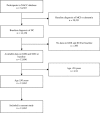Depression, subjective cognitive decline, and the risk of neurocognitive disorders
- PMID: 31399132
- PMCID: PMC6689179
- DOI: 10.1186/s13195-019-0527-7
Depression, subjective cognitive decline, and the risk of neurocognitive disorders
Abstract
Background: Depression and subjective cognitive decline (SCD) both predict neurocognitive disorders (NCD). However, the two correlate strongly with each other. It remains uncertain whether they reflect independent neurobiological underpinnings which deserve separate attention. This study evaluated the independent risks of NCD associated with depression and SCD.
Methods: This cohort study included 13,462 participants who were ≥ 50 years and had normal cognition at baseline. The participants were evaluated for depression and SCD and followed up almost annually for incident mild cognitive impairment or dementia (MCI/dementia) (median follow-up = 4.4 years). Depression and SCD were included in Cox-regression to investigate their independent risks of MCI/dementia.
Results: At baseline, 1307 participants (9.7%) had depression and 3582 (26.6%) had SCD. During follow-up, 1490 (11.1%) developed MCI/dementia. Depression and SCD demonstrated independent risks of MCI/dementia (HR 1.4 and 2.0 respectively). The risk was highest when depression and SCD co-occur (HR 2.8), with half of the participants in this group developing MCI/dementia within 7.2 years of follow-up (compared to 12.2 years in participants without depression or SCD).
Conclusions: The findings may change the clinical approach in managing SCD in depression, suggesting the need for greater emphasis on detecting prodromal NCD. They may also have implications to our understanding of NCD, suggesting the need for further research to delineate the commonalities and distinctions in the neurobiological pathways of depression and SCD.
Keywords: Cohort study; Cox regression; Dementia; Geriatric depression scale; Mild cognitive impairment; Subjective cognitive complaints.
Conflict of interest statement
The author declares no competing interests.
Figures


Similar articles
-
Subjective cognitive decline, anxiety symptoms, and the risk of mild cognitive impairment and dementia.Alzheimers Res Ther. 2020 Sep 11;12(1):107. doi: 10.1186/s13195-020-00673-8. Alzheimers Res Ther. 2020. PMID: 32917264 Free PMC article.
-
Trajectories of subjective cognitive decline, and the risk of mild cognitive impairment and dementia.Alzheimers Res Ther. 2020 Oct 27;12(1):135. doi: 10.1186/s13195-020-00699-y. Alzheimers Res Ther. 2020. PMID: 33109275 Free PMC article.
-
Frequency, sociodemographic, and neuropsychological features of patients with subjective cognitive decline diagnosed using different neuropsychological criteria.Alzheimers Res Ther. 2024 Dec 5;16(1):261. doi: 10.1186/s13195-024-01634-1. Alzheimers Res Ther. 2024. PMID: 39639343 Free PMC article.
-
Subjective Cognitive Decline: Level of Risk for Future Dementia and Mild Cognitive Impairment, a Meta-Analysis of Longitudinal Studies.Neuropsychol Rev. 2022 Dec;32(4):703-735. doi: 10.1007/s11065-021-09522-3. Epub 2021 Nov 8. Neuropsychol Rev. 2022. PMID: 34748154 Review.
-
A Systematic Review of Subjective Cognitive Characteristics Predictive of Longitudinal Outcomes in Older Adults.Gerontologist. 2023 May 9;63(4):700-716. doi: 10.1093/geront/gnac109. Gerontologist. 2023. PMID: 35908232
Cited by
-
The influence of social participation and depressive symptoms on cognition among middle-aged and older adults.Heliyon. 2024 Jan 6;10(2):e24110. doi: 10.1016/j.heliyon.2024.e24110. eCollection 2024 Jan 30. Heliyon. 2024. PMID: 38293386 Free PMC article.
-
The association between shift work exposure and cognitive impairment among middle-aged and older adults: Results from the Canadian Longitudinal Study on Aging (CLSA).PLoS One. 2023 Aug 23;18(8):e0289718. doi: 10.1371/journal.pone.0289718. eCollection 2023. PLoS One. 2023. PMID: 37610977 Free PMC article.
-
rTMS modulates precuneus-hippocampal subregion circuit in patients with subjective cognitive decline.Aging (Albany NY). 2020 Nov 30;13(1):1314-1331. doi: 10.18632/aging.202313. Epub 2020 Nov 30. Aging (Albany NY). 2020. PMID: 33260151 Free PMC article. Clinical Trial.
-
Altered Insular Subregional Connectivity Associated With Cognitions for Distinguishing the Spectrum of Pre-clinical Alzheimer's Disease.Front Aging Neurosci. 2021 Feb 10;13:597455. doi: 10.3389/fnagi.2021.597455. eCollection 2021. Front Aging Neurosci. 2021. PMID: 33643021 Free PMC article.
-
Subjective cognitive decline is a better marker for future cognitive decline in females than in males.Alzheimers Res Ther. 2022 Dec 29;14(1):197. doi: 10.1186/s13195-022-01138-w. Alzheimers Res Ther. 2022. PMID: 36581949 Free PMC article.
References
-
- Jessen F, Amariglio RE, van Boxtel M, Breteler M, Ceccaldi M, Chetelat G, Dubois B, Dufouil C, Ellis KA, van der Flier WM, et al. A conceptual framework for research on subjective cognitive decline in preclinical Alzheimer’s disease. Alzheimers Dement. 2014;10(6):844–852. doi: 10.1016/j.jalz.2014.01.001. - DOI - PMC - PubMed
-
- Holmen J, Langballe EM, Midthjell K, Holmen TL, Fikseaunet A, Saltvedt I, Tambs K. Gender differences in subjective memory impairment in a general population: the HUNT study, Norway. BMC Psychol. 2013;1(1):19.
Publication types
MeSH terms
Grants and funding
- P50 AG005142/AG/NIA NIH HHS/United States
- P50 AG016573/AG/NIA NIH HHS/United States
- P50 AG047266/AG/NIA NIH HHS/United States
- P30 AG010161/AG/NIA NIH HHS/United States
- P50 AG025688/AG/NIA NIH HHS/United States
- P50 AG005133/AG/NIA NIH HHS/United States
- P50 AG005138/AG/NIA NIH HHS/United States
- P50 AG047366/AG/NIA NIH HHS/United States
- P30 AG019610/AG/NIA NIH HHS/United States
- P30 AG028383/AG/NIA NIH HHS/United States
- P50 AG033514/AG/NIA NIH HHS/United States
- P30 AG013854/AG/NIA NIH HHS/United States
- P30 AG053760/AG/NIA NIH HHS/United States
- P30 AG010124/AG/NIA NIH HHS/United States
- P50 AG023501/AG/NIA NIH HHS/United States
- P50 AG005131/AG/NIA NIH HHS/United States
- P30 AG010133/AG/NIA NIH HHS/United States
- P50 AG016574/AG/NIA NIH HHS/United States
- P50 AG005146/AG/NIA NIH HHS/United States
- U24 AG072122/AG/NIA NIH HHS/United States
- P30 AG035982/AG/NIA NIH HHS/United States
- P50 AG008702/AG/NIA NIH HHS/United States
- U01 AG016976/AG/NIA NIH HHS/United States
- P30 AG008051/AG/NIA NIH HHS/United States
- P50 AG005681/AG/NIA NIH HHS/United States
- P30 AG013846/AG/NIA NIH HHS/United States
- P50 AG047270/AG/NIA NIH HHS/United States
- P50 AG005136/AG/NIA NIH HHS/United States
- P30 AG049638/AG/NIA NIH HHS/United States
- P30 AG012300/AG/NIA NIH HHS/United States
- P50 AG005134/AG/NIA NIH HHS/United States
- P30 AG008017/AG/NIA NIH HHS/United States
- P30 AG062715/AG/NIA NIH HHS/United States
- P30 AG010129/AG/NIA NIH HHS/United States
LinkOut - more resources
Full Text Sources
Other Literature Sources
Medical

